Islamic City Council of Tehran
| Islamic City Council of Tehran | |
|---|---|
| Local council of Greater Tehran | |
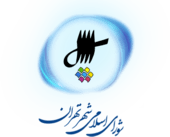 | |
| Type | |
| Type | |
Term limits | 4 years[1] |
| History | |
| Founded | 29 April 1999[1] |
| Preceded by | Anjoman-e-Shahr |
New session started | 23 August 2017[2] |
| Leadership | |
Chairman | |
Vice Chairman | |
1st Secretary | |
2nd Secretary | |
Spokesperson | |
Treasurer |
Hassan Rasouli Since 3 September 2017 |
| Structure | |
| Seats |
21 (Since 2017)
|
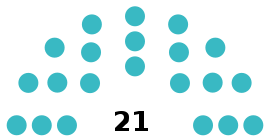 | |
Political groups | List of Hope (21) |
| Committees |
List
|
| Authority | Tehran, Rey, Tajrish |
| Elections | |
| Plurality-at-large voting | |
Last election | 19 May 2017 |
| Meeting place | |
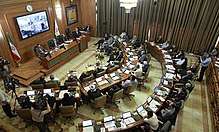 | |
|
City Council Building Behesht Street Tehran | |
| Website | |
| Tehran City Council Website | |
The Islamic City Council of Tehran (Persian: شورای اسلامی شهر تهران) is the directly elected council that presides over the city of Tehran, elects the Mayor of Tehran in a mayor–council government system, and budgets of the Municipality of Tehran.
The council is composed of twenty one members elected on a Plurality-at-large voting basis for four-year terms. The Chairman and the Deputy Chairman of the Council are chosen by the council at the first regular meeting in odd-numbered years.
It holds regular meetings on Sunday, Tuesday and Wednesday at 10 am (except on holidays or if decided by special resolution not to meet).
History
Persian Constitutional Revolution passed a law on local governance known as “Ghanoon-e Baladieh”. The second and third articles of the law, on “anjoman-e baladieh”, or the city council, provide a detailed outline on issues such as the role of the councils in the city, the members’ qualifications, the election process, and the requirements to be entitled to vote. Baladieh, or the modern municipality in Iran was established in 1910, to cope with the growing need for the transformation of Tehran’s city structures.[3]
After the First World War, Reza Shah, the founder of the Pahlavi dynasty, immediately suspended the “Ghanoon-e Baladieh” of 1907 and the decentralized and autonomous city councils were replaced by centralist/sectoralist approaches of governance and planning.[3]
Members
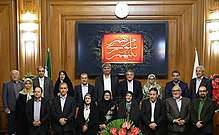
Previous members
Chairpersons
| № | Term | Chairman | Affiliation | Term of office | Vice Chairman | Affiliation | Term of office | ||||
|---|---|---|---|---|---|---|---|---|---|---|---|
| 1 | 1st | 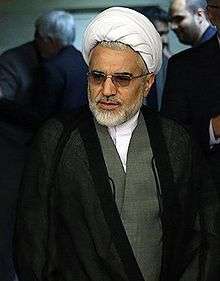 |
Abdollah Noori | Combatant Clerics | April 1999 — September 1999 |  |
Saeed Hajjarian | Participation Front | April 1999 — February 2002 | ||
| 2 | 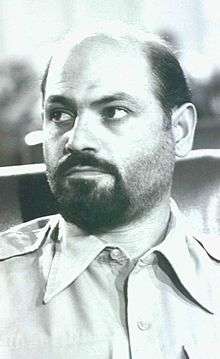 |
Abbas Douzdouzani | Participation Front | September 1999 — December 1999 | |||||||
| 3 |  |
Rahmatollah Khosravi | Forces of Imam's Line | December 1999 — May 2001 | |||||||
| 4 |  |
Mohammad Atrianfar | Executives of Construction | May 2001 — January 2003 | |||||||
.jpg) |
Ebrahim Asgharzadeh | Solidarity Party | February 2002 — January 2003 | ||||||||
| 5 | 2nd | Mehdi Chamran | Alliance of Builders | April 2003 — September 2013 | 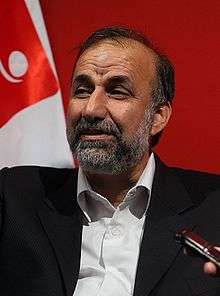 |
Hassan Bayadi | Alliance of Builders | April 2003 — September 2013 | |||
| 3rd | |||||||||||
| 6 | 4th |  |
Ahmad Masjed-Jamei | Non-partisan Reformist | September 2013 — September 2014 | 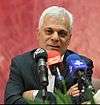 |
Morteza Talaie | Progress and Justice Population | September 2013 — August 2017 | ||
| (5) | 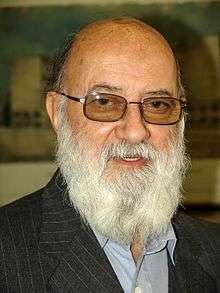 |
Mehdi Chamran | Non-partisan Principlist | September 2014 — August 2017 | |||||||
| pro tem |
5th | 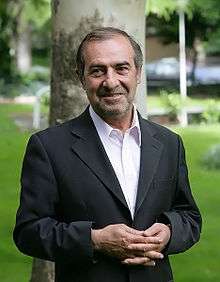 |
Morteza Alviri | Executives of Construction | May — August 2017 | 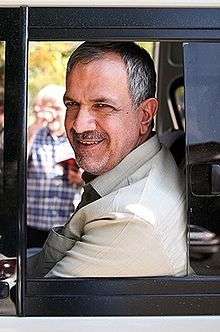 |
Ahmad Masjed-Jamei | Non-partisan Reformist | May — August 2017 | ||
| 7 | 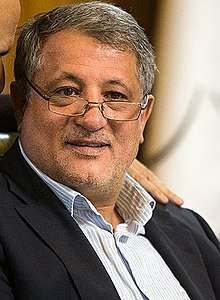 |
Mohsen Hashemi | Executives of Construction | August 2017 — present | 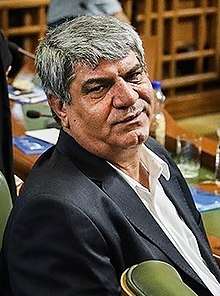 |
Ebrahim Amini | National Trust Party | August 2017 — present | |||
Composition
Election results
| Years | Seats | Composition | Ref | |||||||||||||||||||||||||||||||
|---|---|---|---|---|---|---|---|---|---|---|---|---|---|---|---|---|---|---|---|---|---|---|---|---|---|---|---|---|---|---|---|---|---|---|
| 1999 | 15 |
|
[4] | |||||||||||||||||||||||||||||||
| 2003 |
|
[4] | ||||||||||||||||||||||||||||||||
| 2006 |
|
[5] | ||||||||||||||||||||||||||||||||
| 2013 | 31 |
|
[6] | |||||||||||||||||||||||||||||||
| 2017 | 21 |
|
[7] |
Timeline
| No. | Date | 1 | 2 | 3 | 4 | 5 | 6 | 7 | 8 | 9 | 10 | 11 | 12 | 13 | 14 | 15 | 16 | 17 | 18 | 19 | 20 | 21 | 22 | 23 | 24 | 25 | 26 | 27 | 28 | 29 | 30 | 31 |
| 1 | 1999-04-29[lower-alpha 1] | R | N/A | |||||||||||||||||||||||||||||
| 2000-01-03[lower-alpha 2] | R | I | ||||||||||||||||||||||||||||||
| 2003-01-15[lower-alpha 3] | Vacant | |||||||||||||||||||||||||||||||
| 2 | 2003-04-29[lower-alpha 1] | I | C | |||||||||||||||||||||||||||||
| 2006-12-06[lower-alpha 4] | C | |||||||||||||||||||||||||||||||
| 3[lower-alpha 5] | 2007-04-29[lower-alpha 1] | R | I | C | ||||||||||||||||||||||||||||
| 2009-02-07[lower-alpha 6] | R | C | ||||||||||||||||||||||||||||||
| 2013-06-06[lower-alpha 7] | R | I | C | |||||||||||||||||||||||||||||
| 2013-08-25[lower-alpha 8] | R | I | C | |||||||||||||||||||||||||||||
| 4 | 2013-09-03[lower-alpha 1] | R | I | D[lower-alpha 9] | I | C | ||||||||||||||||||||||||||
| 2013-09-08[lower-alpha 10] | R | I | D[lower-alpha 9] | I | C | |||||||||||||||||||||||||||
| 5 | 2017-08-23[lower-alpha 1] | R | N/A | |||||||||||||||||||||||||||||
| ||||||||||||||||||||||||||||||||
Mayors elected
| # | Mayor elected | Votes | Year | Term |
|---|---|---|---|---|
| 1 | Morteza Alviri | 15 / 15(100%) |
1999 | 1st |
| 2 | Mohammad Hassan Malekmadani | 12 / 15(80%) |
2002 | |
| 3 | Mahmoud Ahmadinejad | 12 / 15(80%) |
2003 | 2nd |
| 4 | Mohammad Bagher Ghalibaf | 8 / 15(53%) |
2005 | |
8 / 15(53%) |
2007 | 3rd | ||
16 / 31(52%) |
2013 | 4th | ||
| 5 | Mohammad-Ali Najafi | 21 / 21(100%) |
2017 | 5th |
| 6 | Mohammad-Ali Afshani | 19 / 21(90%) |
2018 |
References
- 1 2 Hamid Aghabozorgy, Reza Mokhtari Malekabadi, Ahmad Moazzeni (January 2016). "604 Comparative assessing the Performance of fourth period Islamic Councils of Lenjan, and their role in improving urban management". International Journal of Humanities and Cultural Studies (Special). ISSN 2356-5926.
- 1 2 3 4 5 6 "Mohsen Hashemi elected as head of Tehran City Council", Mehr News Agency, 23 August 2017, retrieved 23 August 2017
- 1 2 Vahid Vahdat Zad (2011). "Spatial Discrimination in Tehran's Modern Urban Planning 1906-1979". Journal of Planning History vol. 12 no. 1 49-62. Retrieved 2013-04-11.
- 1 2 "Iran election 'an alarm bell'". BBC. 3 March 2003. Retrieved 1 April 2017.
Reformists took all 15 council seats in 1999. Conservatives have now taken 14.
- ↑ Raz Zimmt (22 December 2006). "Election Results for the Assembly of Experts and Local Councils: Preliminary Appraisal". ACIS Iran Pulse. Retrieved 1 April 2017.
The results in Tehran give the list of Qalibaf's followers ("Usulgarayan") eight of the 15 seats, the reformists' four and Ahmadinejad's followers two. Another seat went to an independent candidate, close to Qalibaf.
- ↑ Ali M. Pedram (20 June 2013). "Reformists return to power in Iran's local elections". Asharq Al Awsat. Archived from the original on 4 March 2016. Retrieved 1 April 2017.
Thirty-one council seats were up for grabs in Tehran, with 13 going to reformists. Although conservatives won 18 seats in the capital in total... Although the composition of Tehran’s new city council appears to give conservatives a majority with 18 seats, four of these were won by previously apolitical celebrity athletes, who observers speculate may be open to changing their affiliation in the future.
- ↑ "Pro-Rohani Reformists Sweep Tehran Council Elections". Radio Free Europe/Radio Liberty. 21 May 2017. Retrieved 21 May 2017.
External links
- Islamic City Council of Tehran, the council's website (in Persian)